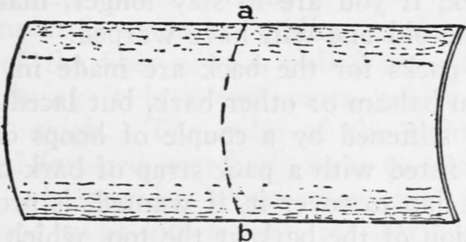Bark Fish Buckets And Corseaux
Description
This section is from the book "Camping And Woodcraft", by Horace Kephart. Also available from Amazon: Camping and Woodcraft.
Bark Fish Buckets And Corseaux
Every trout fisherman knows how bothersome a willow cieel is when he is fishing the brushy head waters of a stream. And a creel is a nuisance not to be thought of wThen one is off on a hiking trip. A canvas bag, with or without rubber lining, is compact enough, but it is mussy and does not keep the fish in good order. To carry trout on a stringer is barbarism. So, look for a young basswood, or poplar, or other smooth-barked tree that will peel. It need not be more than 9 or ic inches thick. Strip from it a rectangular sheet about 12 x 22 inches.

Fig. 95. Fold for fish bucket.
Also cut a bark carrying strap about 4^ feet long, and a quite narrow one for thongs.
Fold the sheet of bark across the middle of the longer dimensions {a-b, Fig. 95), and bring the ends together, one overlapping the other. The natural convexity of the bark spreads it out into an oval at the top. If the bucket were to be used for berry picking, or the like, you would fasten the top by merely cutting holes through at A, Fig. 96, and the corresponding point on the opposite side, and tying with bark thongs. For a fish basket, the thong is strung crisscross as shown in the illustration, as this keeps the fish from flopping out. Attach a bark shoulder strap through slits in the back, and the thing is done. You have a sweet, clean "bucket" that carries under the left arm without bulging so much as a creel, and no top is needed. Put clean ferns or grass over the fish when the sun is hot, and they will keep moist and firm and well-colored, all day. This bucket is easier to wash than a creel. In a week, if you are to stay longer, make a new one, as the old one will have warped.
Large packs for the back are made in the same way, from balsam or other bark, but laced up along the sides, stiffened by a couple of hoops on the inside, and fitted with a pack strap of bark or plaited fiber. A flap to cover it, if wanted, is provided by an extension of the bark at the top, which is rossed off to make it flexible. Such a carrier is called by the French Canadians a corseau (from casseau). In warm weather it is more comfortable to carry than a blanket pack, as it does not sweat the back.
Continue to:
